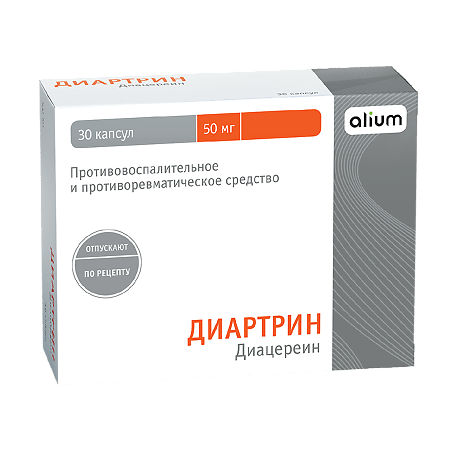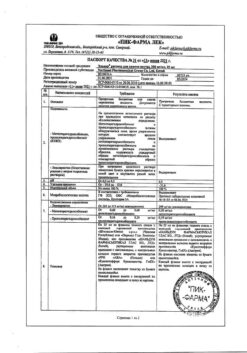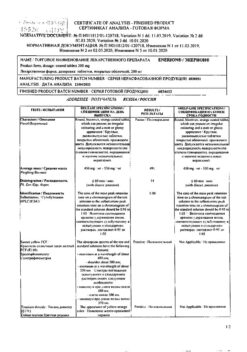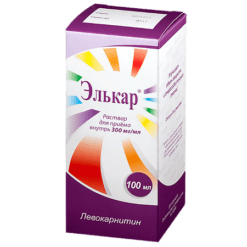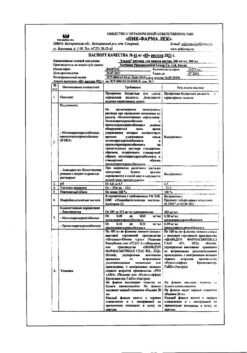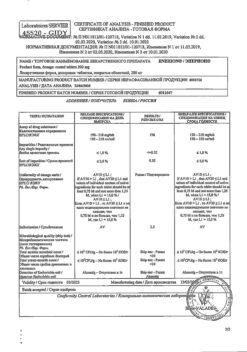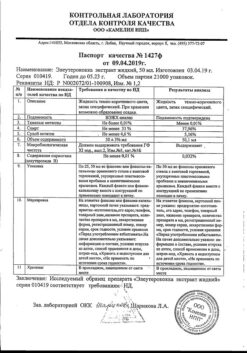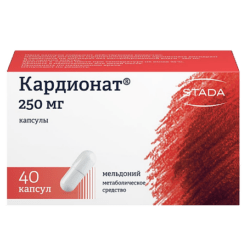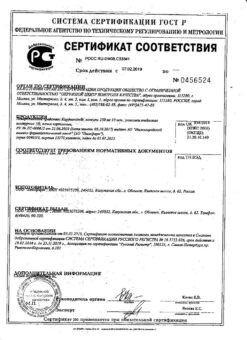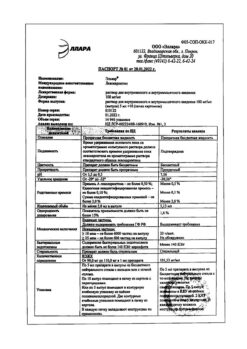No products in the cart.
Diartrin, 50 mg capsules 30 pcs
€25.22 €21.01
Out of stock
(E-mail when Stock is available)
Description
Pharmacodynamics
Diacerein is an anthraquinoline derivative, a diacetylated derivative of Rein.
Metabolized to the active metabolite reine, it inhibits the activity of interleukin-1, which plays an important role in the development of inflammation and cartilage degradation in osteoarthritis.
Diacerein inhibits the action of other cytokines, including interleukin-6, tumor necrosis factor-ɑ. Diacerein also inhibits the formation of metalloproteinases (collagenase, elastase), which are involved in the process of cartilage damage. With long-term use, diacerein stimulates the synthesis of proteoglycans and does not affect the synthesis of prostaglandins. The action develops in 2-4 weeks.
Diacerein has analgesic and anti-inflammatory activity when taken orally.
Pharmacokinetics
Diacerein is rapidly absorbed from the gastrointestinal tract and is completely deacetylated by dorein. Bioavailability is increased by 25% when taken concomitantly with food.
The time to reach maximum plasma concentration of reine (TCmax) is 144 min. With a single administration of 50 mg of diacerein maximum plasma concentration of reine (Cmax) is 3.15 mg/l, with multiple administration, due to the cumulation of the drug, Cmax increases. Rein’s binding to proteins (albumin) is almost 100%. Rein penetrates through the placental and hematoencephalic barriers.
The half-life (T1/2) is 255 min. Rein is excreted by the kidneys unchanged (20%) and as glucuronide (60%) and sulfate (20%).
Indications
Indications
Active ingredient
Active ingredient
Composition
Composition
1 capsule contains:
the active ingredient:
diacerein 50.0 mg;
excipients:
Corn starch 30.0 mg,
Lactose monohydrate 188.95 mg,
colloidal silica (aerosil) 1.5 mg,
povidone K-30 2.2 mg,
crospovidone (type A) 24.0 mg,
sodium lauryl sulfate 0.35 mg,
magnesium stearate 3.0 mg;
solid gelatin capsules:
capsule body and cap – titanium dioxide 1.3333%, quinoline yellow dye 0.9197%, sunset yellow dye 0.0044%, gelatin to 100%.
How to take, the dosage
How to take, the dosage
For oral administration.
The drug should be prescribed by a specialist with experience in the treatment of osteoarthritis (osteoarthritis). The standard intake is 1 capsule 2 times a day (morning and evening after a meal). Since some patients may have liquid stools or diarrhea, it is recommended to start taking 50 mg once a day with a meal in the evening during the first two to four weeks. Then it is possible to use 50 mg 2 times a day with food: the first time with a morning meal, the second time with an evening meal. The capsules should be swallowed whole without opening them and washed with a glass of water.
Elderly
Because elderly patients are more vulnerable to complications associated with acute diarrhea, it is not recommended that patients over 65 years of age with a history of diarrhea be given the drug.
No change in dosage is required when treating elderly patients.
But caution should be exercised. If diarrhea occurs, discontinue treatment and consult your physician.
The effect of treatment should be expected after 2-4 weeks. The drug is taken continuously, either long-term or in courses of at least 4 months.
Renal failure
In patients with moderate renal failure (CKR 30-60 ml/min), the dose should be reduced by half to 50 mg (1 capsule) per day.
Interaction
Interaction
Antacids decrease absorption of diacerein.
The incidence of adverse gastrointestinal reactions may increase if concomitantly taken with drugs that affect the intestinal microflora (including antibiotics), as well as with substances that alter the quality of intestinal contents and the rate of emptying (e.g., fiber).
Drugs containing aluminum hydroxide and/or magnesium hydroxide decrease the bioavailability of diacerein.
Simultaneous use with laxatives is not recommended.
Special Instructions
Special Instructions
The duration of treatment may be long, depending on the result achieved. During the period preceding the development of therapeutic effect, the drug may be taken simultaneously with analgesics and nonsteroidal anti-inflammatory drugs. Periodic monitoring of blood parameters, liver enzymes, urine is necessary. In case of worsening of renal function, the physician should decrease the dose of the drug.
The use of Diacerein is not recommended in rapidly progressing osteoarthritis of the hip and knee joints due to the slow development of the clinical effect of the drug.
Diarrhea
The administration of diacerein often leads to diarrhea (see side effect section), which can cause dehydration and hypokalemia.
If diarrhea occurs, discontinue the drug and contact your doctor immediately to discuss alternative treatment.
Caution should be exercised if the patient receives diuretics at the same time, as dehydration and hypokalemia may occur. Particular caution should be used if hypokalemia occurs in patients who have received cardiac glycosides (digitoxin, digoxin) (see section “Interaction with other medicinal products”)
Combined use of laxative medicinal products should be avoided.
Hepatotoxicity
Post-registration monitoring has revealed cases of elevated serum liver enzyme activity and symptomatic acute liver injury (see section “Adverse Effects”). Side effects.
Before starting treatment, the patient should be asked about concomitant, current and past history of liver disease and should be examined to detect liver functional abnormalities. Liver diseases are contraindications for use of Diacerein (see section “Contraindications”).
The laboratory and clinical manifestations of liver damage should be controlled, precautions should be taken when using simultaneously with other medicinal agents with characteristic risk of hepatotoxic reactions. Patients should be advised to limit alcohol consumption during use of Diacerein.
The treatment with diacerein should be discontinued if increased liver enzyme activity is found or the development of symptoms of liver damage is suspected. The patient should be informed of the signs and symptoms of hepatotoxicity and advised to see a physician immediately if liver symptoms are suspected.
Impact on the ability to drive vehicles, operate machinery and engage in other activities requiring increased concentration
The effect on concentration, speed of psychomotor reactions when driving vehicles, operating machinery and engaging in other potentially dangerous activities has not been studied.
Synopsis
Synopsis
Contraindications
Contraindications
Hypersensitivity to diacerein, other drug components or anthraquinone derivatives; inflammatory bowel disease (ulcerative colitis, Crohn’s disease); intestinal obstruction; abdominal pain of unclear genesis; patients with liver disease (including vanamnesis).patients with liver diseases (including vanamnesis); severe renal insufficiency (CKR less than 30 ml/min); lactase deficiency, lactose intolerance, glucose-galactose malabsorption; pregnancy and lactation; children under 18 years of age.
With caution
Moderate renal insufficiency (CK 30-60 ml/min).
Irritable bowel syndrome.
Patients 65 years and older.
Side effects
Side effects
According to the WHO classification, adverse effects are classified according to their frequency of development as follows: Very common (â¥1/10), common (â¥1/100 to < 1/10), infrequent (â¥1/1000 to < 1/100), rare (â¥1/10000 to < 1/1000), very rare (< 1/10000), frequency unknown – the incidence could not be determined from available data.
Immune system disorders
Infrequent: allergic reactions, urticaria, bronchospasm, angioedema, anaphylactic shock.
Gastrointestinal disorders
Rarely:diarrhea, nausea, vomiting, abdominal pain.
Disorders of the liver and biliary tract
Infrequent:increased activity of “liver” enzymes.
Skin and subcutaneous tissue disorders
Infrequent: cutaneous itching, rash.
General disorders
Rarely:malaise.
Frequency unknown:Intensive yellow to brown staining of urine (depending on pH) (not clinically relevant and does not require drug withdrawal or dose reduction).
If any of the adverse reactions listed in the instructions worsen, or if you notice other adverse reactions not listed in the instructions, tell your doctor.
Overdose
Overdose
Symptoms: diarrhea, weakness.
Treatment: symptomatic. In severe diarrhea it is necessary to replenish the water-electrolyte balance.
Pregnancy use
Pregnancy use
Similarities
Similarities
Additional information
| Shelf life | 3 years. Do not use after the expiration date stated on the package. |
|---|---|
| Conditions of storage | In a dry place protected from light at a temperature not exceeding 25 oC. Keep out of reach of children. |
| Manufacturer | Alium JSC, Russia |
| Medication form | capsules |
| Brand | Alium JSC |
Related products
Buy Diartrin, 50 mg capsules 30 pcs with delivery to USA, UK, Europe and over 120 other countries.

